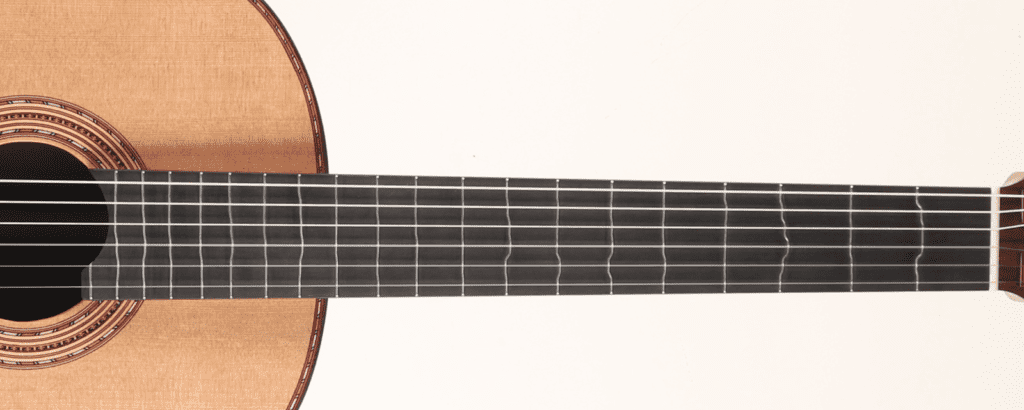We are playing with fire here.
Saying that guitars are annoying in any way on a site that aims at guitar lovers? Better watch out!
But being realistic, there are tons of forms in which a guitar could be considered annoying.
Maybe the strings are old and rusted. Maybe the pickups don’t function properly.
Maybe the effect pedals are being used in the wrong manner. Or maybe the player simply sucks!
This time, however, we are aiming for specific reasons at a specific target: people with perfect pitch.
Those who have absolute pitch may find guitars annoying. And no, it has nothing to do with the gear, the settings, or the player.
It’s a matter of tuning. And even if a guitar is tuned okay, it will be insufficient for someone with perfect pitch.
Why?
Guitars are never properly tuned. As a result, people with perfect pitch could find guitars annoying, because they perceive the notes as unbalanced. For normal people, however, the difference is so slight that it passes unnoticed.
Great. We already know why some people may find guitar annoying.
The question now is, why does this happen? Why are guitars never in tune?
The good news is, we’ll answer all your doubts in this article.
Keep reading and find the reasons behind this strange phenomenon.
What makes the guitar an imperfect instrument?
It’s painful to say this, but guitars are not perfect.
I know, I know. For guitarists, this instrument couldn’t be better.
They can be a source of inspiration, fun, or even income. They are a hobby, and most often than not, a lifestyle.
So, of course, for guitarists, the guitar will always be a flawless instrument.
However, our perception doesn’t affect the facts.
In reality, guitars have a couple of faults.
For example, some guitars tend to buzz. This is the result of an imperfect fret, which may come like that directly from the factory or could occur after years of playing.
In other words, it is either not professionally leveled or the frets wear out over time.
The vibration of the strings against a poor fretboard will resonate creating a buzz.
Luckily, this tends to be the case with acoustic guitars only. In electric guitars, the buzz won’t be heard through the amp (unless it’s extreme) due to the way guitar pickups work.
Although the difference is minimal, buzz affects the overall tone, which all in all affects its perfection.
Now, there’s a bigger reason why guitars are “imperfect”: Guitars always play out of tune.
It seems strange considering that we are so used to their sound, but it is true.
This is not a problem that can be solved with the tuning peg and a perfect tuner. Instead, it has to do with how the instrument is constructed.
The guitar is in the equal temperament tuning system. This means that the 12 musical notes are equally distributed on the fret.
However, the equal temperament system is not mathematically perfect. There are some tiny differences regarding the frequency of the notes and their position on the fretboard.
As a result, one gets an “approximation” of where the notes are through the fretboard.
All in all, it is logically futile to get a perfect tone with a regular guitar.
Plus, the same theory applies to other instruments such as the piano, bass, ukelele, and violin.
So, it seems rather natural. But is this a real issue for musicians?
Why would guitars annoy people with perfect pitch?
Average people find the sound of a properly tuned guitar amusing.
In fact, the guitar is so particular that even if it’s loud and distorted, it will still sound great.
Nonetheless, it tends not to be the case for everyone. And I’m not referring to those who don’t enjoy the guitar itself.
I’m talking about people with perfect pitch.
Absolute pitch is the capacity of perceiving a musical note without a reference tone.
That is to say, someone with a perfect pitch can identify a note just by hearing it.
For you to get an idea of how strong this ability is, just consider that someone with perfect pitch can name the pitches of the sound of alarms or car horns.
It’s worth mentioning, that people with absolute pitch are a rarity. It is believed that only one in 10,000 has this capability.
With all this said, what happens when a perfect pitch individual listens to a guitar?
Well, he or she will notice the “unbalance” between notes, making the sound annoying.
However, this is not the case for everyone with a perfect pitch.
Some may get used to how standard guitars work, and once this is accepted, they can play the instrument without much intolerance.
Can people with perfect pitch still play the guitar?
Absolute pitch is not a curse.
Of course, there are probably many who struggle with irregular equilibrium on equal temperament instruments.
But all in all, music is not completely a matter of nature but of social constructions as well.
See, music is shaped by the culture we live in. Despite the mathematics behind the theory, it is undeniable that people “choose” what’s accepted and what is not.
Some cultures may find singing with screams insufferable. On the contrary, others may enjoy and accept them as the norm.
What I’m trying to say with this is that musicians with perfect pitch learn to overcome the issue with guitars, because they know that it is the natural sound the instrument produces.
In the end, the sound becomes familiar because the majority considers it that way.
Is there a way to achieve a “perfect” tuning with a guitar?
It is impossible to tune a regular guitar to perfection, whether it be electric, acoustic, or electroacoustic.
Even if you tune the open strings in the right way, they will sound detuned once you press your fingers on the fretboard.
But, if open strings can be tuned to perfection, then they can be used for recordings.
Thus, by tuning to a determined chord, it is possible to obtain a perfect sound.
Needless to say, this case will only apply to studio recordings, where it is plausible to do such a thing.
For live performances, just forget about it.
Unless, of course, you play with a true temperament guitar, which is the best alternative.
What are true tempered frets?
Guitars with true-tempered frets are probably the only way to play with a perfect tune.
These types of guitars come with curved, irregular fret wires, which limitate and differentiate between one note and the other.
This way, every note is in tune with the rest of them all across the fretboard.
They come in handy, especially when playing chords (which after all, is one of the main forms of making music with a guitar). I’m mentioning this because for techniques such as bendings, even-tempered guitars are not much of a problem.
Conversely, progressing from one chord to the other on normal guitars will create an out-of-tune effect.
With a true temperament guitar, you can get rid of this matter.

Source: Guitar City Magazine
Should you worry about the imperfections of the guitar?
If you were unaware of this fact, you may be wondering what should you do from now on.
Should you get a guitar with true-tempered frets? Will you ever be able to listen to the guitar the same way you used to be?
After all, now you know that guitars are imperfect based on music theory.
Is this a real problem?
Well, truth is, it is not.
You shouldn’t worry about the imperfections of the guitar. They’ve been working that way for centuries, and almost no one complains about their flaws.
Once again, the way we perceive music goes beyond logic. It is also a question of perception.
Some instruments are made to be played correctly. If you barely play the violin, for example, then the music you create will be horrendous until you hone your skills.
This, however, is not the case for the guitar.
The guitar can bear some errors or mistakes and still sound fantastic. And this is notably the case with electric guitars.
You can distort its sound with the amp, add lots of effects with your pedals, and still figure out a way to make acceptable music.
It’s fascinating! And we should be grateful for having such a noble instrument.
Yes, guitars are not perfect. But we are humans, not machines.
We may strive for perfection but we know that that is an impossible task.
So now go and pick up your guitar. They were made for one purpose: to make us happier and limited human beings.

Hello there, my name is Ramiro and I’ve been playing guitar for almost 20 years. I’m obsessed with everything gear-related and I thought it might be worth sharing it. From guitars, pedals, amps, and synths to studio gear and production tips, I hope you find what I post here useful, and I’ll try my best to keep it entertaining also.





